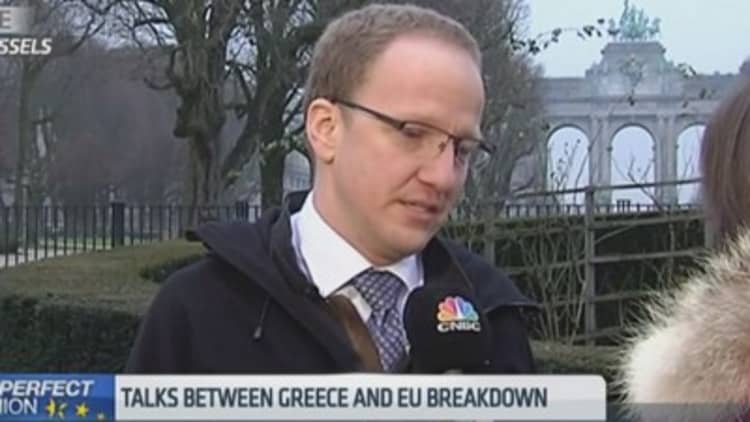
The next few days will be crucial for the future of both Greece and the euro zone. After the acrimonious collapse of talks Monday night, what options are left ahead of the expiry of Greece's current bailout loan on February 28?
Monday was, of course, never a "hard" deadline, and there is still some, very limited, time to find a deal which can save face for both the new Greek government and the rest of the euro zone.
Yanis Varoufakis, the Greek finance minister, said on Tuesday: "We know in Europe how to deliberate a very good and honourable solution out of initial disagreement." There are plenty in the euro zone hoping he is right, as concerns grow that the current impasse may not be resolved.
Greek Prime Minister Alexis Tsipras was in equally combative mood Tuesday when he told he told parliamentary members of his radical left wing Syriza party that Greece could no longer be treated "like a colony or pariah in Europe".
When’s the next ‘deadline’?
On Wednesday, there is an European Central Bank (ECB) meeting at which Greek banks' use of its emergency liquidity assistance (ELA) facility will be discussed – and after which the ECB may give more clarity as to when/whether it will put a cap on its funding for Greek banks.
This is important because, when you take away ELA as a backstop, there's effectively no incentive to keep your money in a Greek bank unless you're extremely patriotic. To avoid mass withdrawals, the Greek government may have to impose capital controls. "Then, the domestic politics gets ugly everywhere," Guntram Wolff, director of Bruegel, the European think tank, told CNBC.
Varoufakis hasn't really said clearly what he wants, other than more money, less conditions. At some point, the ECB will have to close the tab."
Third bailout?
By Friday, if Greece hasn't asked to legally extend the current program (which would need to be approved by six national parliaments in the euro zone), the only option left is for the country to a request for a third bailout, according to Jeroen Dijsselbloem, who chairs the Eurogroup of the region's finances ministers. This would mean being in hock to international creditors for even longer, and Varoufakis has said it's not what the Greek people want.
"This is one dramatic battle between love and hate in Greece – love of the euro zone and hatred of austerity," Gabriel Sterne, head of global macro research at Oxford Economics, told CNBC.

What’s the deal with February 28th?
This date is regularly talked of as the time when Greece's bailout expires. However, it's not quite the point of "no return" – this would come when the ECB closes the ELA tap, or when the Greek government runs out of finance, both of which are likely to follow hard on the heels of the existing bailout concluding with no deal.
What will markets do if a deal is agreed?
The euro will regain strength, Greek banks stocks should soar – and the rest of Europe could also benefit.
"We suspect that Greek volatility is holding back global managers who would otherwise buy Europe," according to Morgan Stanley's research team.
…and if it isn’t?
Just because euro zone leaders seem confident that Greece could potentially exit the euro zone without substantial contagion to other countries, it doesn't mean the market shares their confidence. There are a growing number of voices arguing it mightn't be too bad for Greece in the long term, however.
"They're going to get a big default if they leave, get rid of a lot of the debt, depreciation in deposits. All the hedgies will be hovering around Greece. After six months of pure horribleness, there could be a good recovery," Sterne said.
- By CNBC's Catherine Boyle




